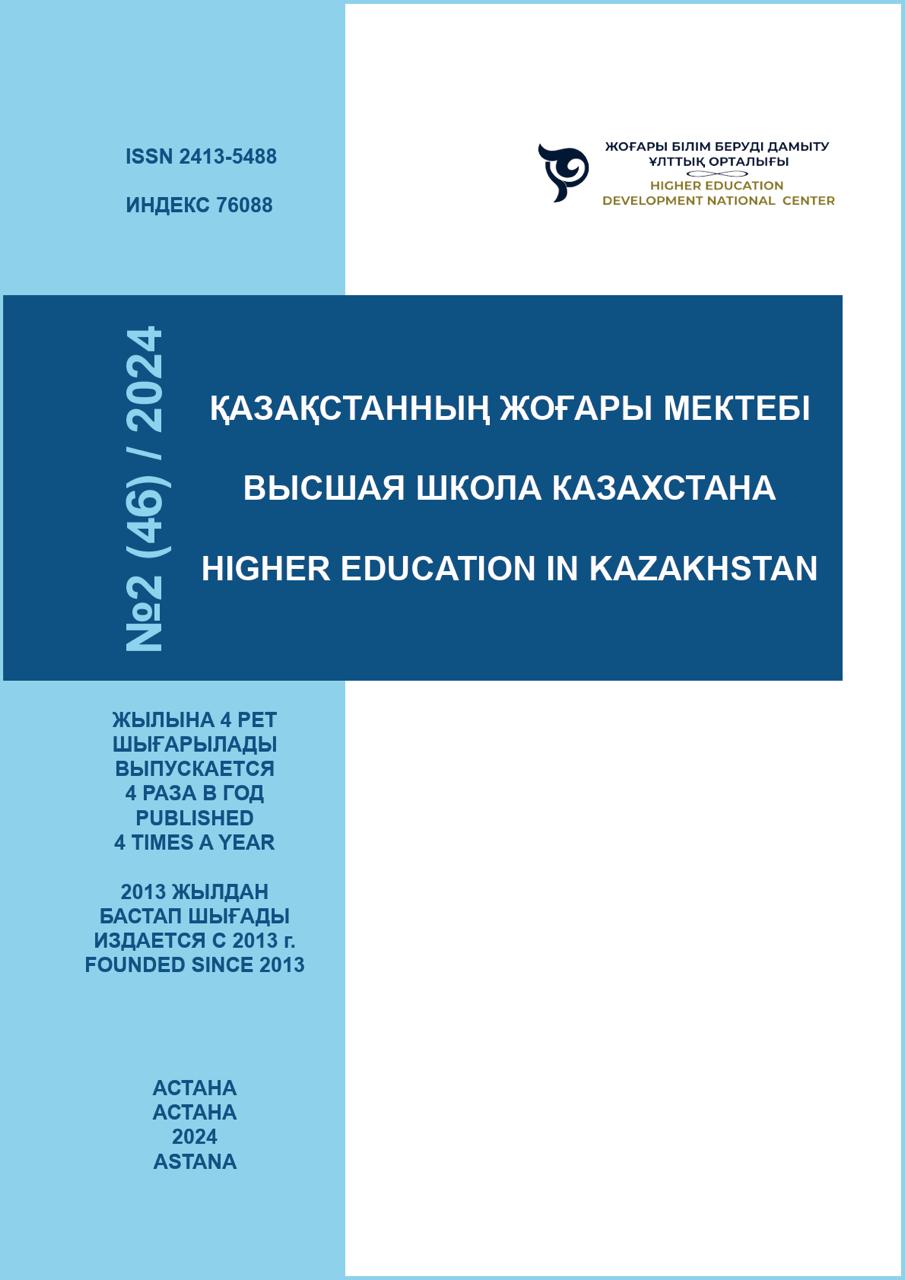REFLECTION OF THE COMPETENCE MODEL OF A PEDAGOGICAL UNIVERSITY GRADUATE IN REGULATIVE DOCUMENTS
DOI:
https://doi.org/10.59787/2413-5488-2024-46-2-118-127Аңдатпа
This article examines the competency model of a graduate, which is based on the individual`s personal qualities and their readiness to apply the acquired knowledge, skills, and abilities. This article examines the competency model of a graduate, which is based on the subject’s personal qualities, his adaptability and willingness to apply acquired knowledge, skills and abilities in changing sociocultural conditions.
The aim of this work is to identify the competencies that a graduate of a pedagogical university should possess, based on a content analysis of the regulatory documents of the Republic of Kazakhstan. These are the “State Compulsory Standard of Higher Education” and the “Teacher” Professional Standard”. It has been found that the SCSHE defines a set of general cultural, research, and communicative competencies. Professional competencies are formulated in the most general form without reference to the specific professional activity of a university graduate. The detailed description of graduate`s professional competencies of pedagogical universities should be based on the “Teacher” Professional Standard. Thus, a comprehensive and effective competency model of a teacher can only be developed by taking into account both the SCSHE and the “Teacher” Professional Standard.
Әдебиеттер тізімі
Adolf, V. (1998). Professional'naya kompetentnost' sovremennogo uchitelya [Professional competence of a modern teacher]. Krasnoyarsk: Krasnoyarskij gosudarstvennyj universitet, 310 p.
Ananyev, B. (2008) Lichnost', sub"ekt deyatel'nosti, individual'nost' [Personality, subject of activity, individuality]. Moskva: Direkt-Media, 134 p.
Andrienko, A. (2018). Kompetentnostno-orientirovannyj podhod v sisteme vysshego obrazovaniya: istoriya, sovremennoe sostoyanie i perspektivy razvitiya [Competency-based approach in the system of higher education: history, modern state and prospects of development]. Cheboksary, 92 p.
Kazinec, V., Trinadcatko, O. (2020) Kompetentnostnaya model' vysshego obrazovaniya [Competence-based model of higher education]. Sovremennye naukoemkie tekhnologii,12–1, 160–165.
Kodzhaspirova, G. (2005) Pedagogicheskij slovar' [Pedagogical dictionary]. http://niv.ru/doc/dictionary/pedagogical/fc/slovar-202.htm#zag-344
Kuang M., Chang M. (2015) College Students’ Advanced Model Cultivation Mechanism in a New Period – Taking a university in Wuhan as an example. SHS Web of Conferences. https://doi.org/10.1051/shsconf/20151902001
Mejía-Mercado, E.L., Romero-González, Z. (2021). Pedagogical models and their application to pedagogical strategies for citizenship education. Perspectivas. 7, (1), 56–65. https://doi.org/10.22463/25909215.3352
Ministry of Education Of the Republic of Kazakhstan (2022). Professional'nyj standart "Pedagog". [Professional standard "Teacher"]. Order of Acting Minister of Education of the Republic of Kazakhstan dated December 15, 2022 No. 500. Registered with the Ministry of Justice of the Republic of Kazakhstan on December 19, 2022 No. 31149. https://adilet.zan.kz/rus/docs/V2200031149
Ministry of Science and Higher Education Of the Republic of Kazakhstan (2022). Gosudarstvennyj obshcheobyazatel'nyj standart vysshego i poslevuzovskogo obrazovaniya [State obligatory standards of higher and postgraduate education]. Order of the Minister of Science and Higher Education of the Republic of Kazakhstan dated July 20, 2022 No. 2. Registered with the Ministry of Justice of the Republic of Kazakhstan on July 27, 2022 No. 28916.. https://adilet.zan.kz/rus/docs/V2200028916
Nigmatzyanova, G. (2014). Struktura i soderzhanie obshchekul'turnyh kompetencij studenta [Structure and content of general cultural competencies of a student]. Gumanitarnye nauchnye issledovaniya, 2. https://human.snauka.ru/2014/02/5851
Nurzhanova, R., Temirgazina, Z. (2023). Model' vypusknika-filologa: kompetentnostnyy podkhod [Model of a graduate philologist: competency-based approach]. Yаzyk i literatura: teoriya i praktika, 2, 62–72. https://doi.org/10.52301/2957-5567-2023-2-62-72
Omarova, S., Igna O., Mukhatayev A. (2022). Problemy kompetentnostnogo podkhoda v podgotovke i povyshenii kvalifikatsii kadrov [Problems of the competency-based approach in training and advanced training of personnel]. Kazakstannyn zhoġary mektebí. Vysshaya shkola Kazakhstana, 4 (40), 5–13.
Omirbayev S., Mukhatayev A., Kassenov K., Kuangaliyeva K., Akhmetova Sh. (2023). Analiz normativno-pravovyh aktov: kachestvenno-kolichestvennaya harakteristika soderzhaniya strategicheski znachimyh dokumentov v oblasti obespecheniya kachestva vysshego i poslevuzovskogo obrazovaniya v Kazakhstane [Analysis of normative legal acts: qualitative and quantitative characteristics of the content of strategically important documents in the field of quality assurance of higher and postgraduate education in Kazakhstan]. Vestnik Evrazijskogo nacional'nogo universiteta imeni L.N. Gumileva, 2(143), 260–272.
Opwis, K. (2001). Instructional Technology: Cognitive Science Perspectives. International Encyclopedia of the Social & Behavioral Sciences, 7573–7577. https://doi.org/10.1016/B0-08-043076-7/01476-5
Radevskaya, N., Imanov, G. (2017). Strukturno-soderzhatel'nye smysly kompetentnostnoj modeli vypusknika vuza [Structural and content meaning of the competence model of a university graduate]. Chelovek i obrazovanie, 2 (51), 15–19.
Semashchenko, A., Temirgazina, Z. (2022). Diagnostika urovnya ponimaniya i interpretatsii uchashchimisya khudozhestvennogo teksta [Diagnosis of the level of understanding and interpretation of a literary text by students]. Yazyk i literatura: teoriya i praktika,2, 70–84. https://doi.org/10.52301/2957-5567-2022-2-70-84
Solodova, T. (2008) Ot kompetentnostnoj modeli vypusknika k kompetentnomu vypuskniku [From competency model of graduate to competent graduate]. Vestnik VolGU, 6 (11), 34–39.
Ylonen A., Norwich, B. (2012) Using Lesson Study to develop teaching approaches for secondary school pupils with Moderate Learning Difficulties: Compilers: teachers’ concepts, attitudes and pedagogic strategies. European Journal of Special Needs Education, 27, 1–17. https://doi.org/10.1080/08856257.2012.678664.
Zeer, E. (2008). Psihologiya professij [Psychology of professions]. Moskva: Proekt Mir, 330 p.
Zeer, E., Symanyuk, E. (2011). Kompetentnostnyj podhod kak faktor realizacii innovacionnogo obrazovaniya [Competence-based approach as a factor in the realization of innovative education]. Obrazovanie i nauka, 8, 3–14.

Жүктеулер
Жарияланды
Журналдың саны
Бөлім
Лицензия
Авторлық құқық (c) 2024 "Қазақстанның жоғары мектебі" ғылыми-сараптамалық журналы

Бұл жұмыс лицензия бойынша лицензияланғанCreative Commons Attribution-ShareAlike 3.0 Unported License.





